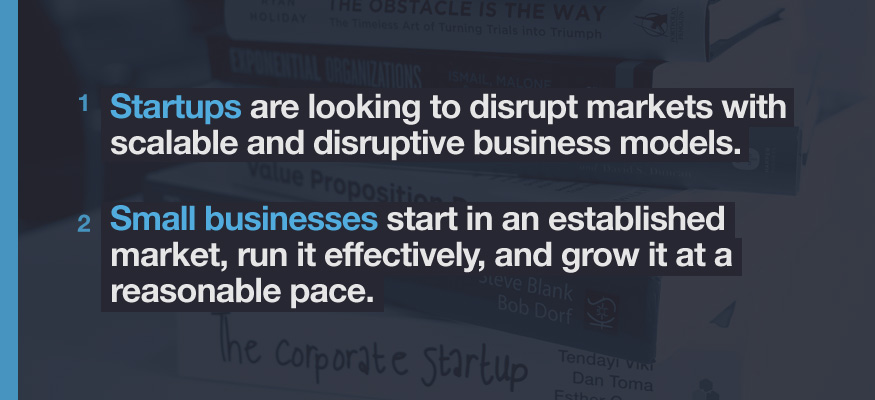If you’ve ever worked in the technology sector, know someone who has, or if you’ve ever caught an episode of Silicon Valley, you’ve heard the term “startup.”
The term “startup” is often linked to emerging technology companies. However, its origins go further back than commonly believed, and it is associated with the post-internet era and post-Dot Com bubble.
“Startup” was coined by a Forbes magazine article in 1976, which said: “The … unfashionable business of investing in startups in the electronic data processing field.” One year later in 1977, a Business Week article wrote, “An incubator for startup companies, especially in the fast-growth, high-technology fields.”
So the term has some staying power, to be sure. But what is it in modern entrepreneurial parlance? Is it just another buzzword used to describe fast-growing technology businesses? Or is there something that actually constitutes what a startup is?
Can a startup be a small business? Can a small business be a startup? If you continue reading, all of your questions will be answered..
Small Business Vs Startup
As it turns out, there are actually differences between startups and small businesses.
For one, a small business is a self-sustaining enterprise that seeks to generate revenue from the day it opens its doors. These businesses don’t require major investments or time to formulate things like corporate structures and employee value propositions.
Generally speaking, small businesses bring in smaller amounts of sales, they are part of a local or regional market, and they have a small number of workers.
By this point, you’re likely saying, “Well duh!” but there are more key differences that set the two apart:
Growth Intent
Startup founders are almost universally looking to impact or disrupt the current market with their startup business idea. Because of that, they’re usually focused on growing and expanding–and they want to do it quickly.
This is a big part of the reason so many startups are founded within the tech industry. Technology is easily scalable, it can raise money quickly, and it has a wide reach.
On the other hand, the SBA defines small businesses as “for-profit businesses of any legal structure, independently owned and operated, not nationally dominant in its field.”
Because of that, the growth intent of small businesses is very different from their startup counterparts. Startups are literally built with the intention of growing, but small businesses may be content to stay small, independent, and regionally specific.

This is also a good place to discuss business objectives. Startups are looking to disrupt markets with scalable and disruptive business models. They want to grow as fast as possible, and they want to beat out all of their competition on their road to success.
In most cases, small business owners don’t really concern themselves with these troubles. To run a small business, you don’t need to trample the competition or cause serious disruption to the market or create a completely new market all your own. Rather, they just want to start a business in an established market, run it effectively, and grow it at a reasonable pace. As long as they’re able to make money while doing that, it would be considered a successful small business.
This is a big reason that startups typically come up in the technology industry while small businesses are found on the Main Streets of the world. Small businesses are local coffee shops, plumbing and HVAC companies, repair shops, grocery stores, dog grooming businesses, and so on. These businesses aren’t turning the world upside down, but they are forming the bedrock of their local communities by creating jobs and supporting the economy. Indeed, small businesses employ roughly 60 million people in the United States alone.
End Goals

Is there an end goal for your business? If you’re just looking to stay in business, create profit, and keep your workers employed, then you’re a small business.
Small business owners generally want to create self-sustaining and long-lasting enterprises.
For their part, startups are actually intended to be temporary. The function of a startup is to find a repeatable and scalable business model. Assuming that is successful, the company becomes a massive organization that eventually goes public with an IPO or it’s bought out by an even larger company.
Funding
One thing that both small businesses and startups have in common is that they’re almost always in need of funding, especially in the early stages.
Of course, investing in either one can be a risky proposition for investors. However, the key difference is the type of funding that each one uses.
Startups typically look for major investments from the very beginning. You’ll hear phrases like “unicorns,” “second rounds,” and “burn rate” thrown around a lot in this world. Venture capitalists and angel investors will typically invest at least $1 million in the first and second rounds of funding.
Small businesses, meanwhile, will typically use debt financing through small business loans to raise the money they need. Traditional banks and lenders will offer smaller amounts of capital and charge interest for those loans.
For startup founders, their relationship with their financiers can be considered a partnership, while small business owners tend to look at their funding as a typical transaction.
Amount Of Risk
No matter what type of company you’re starting, there’s always a certain amount of risk involved. But if you’re looking at startup vs small business, startups certainly have a lot more risk associated with them.
The purpose of a startup is to disrupt by creating a product or service that can shift paradigms and impact the market.. These types of businesses involve a massive amount of research, testing, raising money, and growing the company. They require a lot of faith that the startup will succeed and will have lasting effects on the world.
Because you’re taking a huge risk, if you succeed, you succeed big. But conversely, you have a lot more to lose if the company doesn’t succeed.
Of course, starting a small business isn’t without its own risks. After all, 20 percent of small businesses fail within a year of opening their doors. But startups in established markets have the advantage of better research and data for informed decisions. That has a way of mitigating risks and making things more manageable than they are for startup owners.
Choosing A Startup Or A Small Business
This is not a matter of entrepreneurship versus small business; both startups and their Main Street counterparts embody an entrepreneurial spirit. Typically, the decision of what type of company to start depends on the nature of the product or service offered and the industry.
For example, many companies in the IT industry will often opt for the startup model because the technology in the industry changes so fast it can be hard for a small business mindset to keep up.
Organizational structure impacts the model chosen between startups and small businesses. Consider the type of organization you create, as it will affect future decisions such as product planning and liquidation. You should try and plan ahead as much as possible before deciding what structure you want to employ.
What Type Of Leader Are You?

The type of leadership style you use should also play into your decision when deciding if you want to follow a startup model or a small business model.
Startup founders often employ a much more charismatic, outgoing approach when it comes to their leadership style. It can also be a transformative leadership style where you motivate people to help them reach their goals. Many successful startups have used both of these types of leadership styles.
Of course, these qualities can be very successful for small business leaders as well, but they don’t normally feel as pressured to be visionaries in their field.
How Do You Think?
Speaking of visionaries, you should also consider what types of ideas you have for your business. If your ideas lend themselves to an overly creative and disruptive mindset, it may be impossible to avoid founding a startup.
Startups are risky, but well-suited for innovation. Ecosystems supporting them are dedicated to helping entrepreneurs achieve goals, and those who think outside the box can benefit from these resources to increase survival chances.
What’s Your Risk Tolerance?
As we’ve said, startups are almost universally considered riskier than small businesses. After all, startup founders are often wading into unfamiliar waters as there is little precedent for what they’re trying to accomplish.
Startups are inherently riskier, and the likelihood of failure is much higher.
While any business venture is risky by its nature, the waters of small business ownership are typically less choppy and fraught with danger.
Other factors that can help dictate whether you should find a startup or a small business can include external factors like the overall industry or the market. However, your personality and preferences should also help you decide.
Conclusion
Whether you start a small business or a startup is not a decision that should be undertaken lightly. Registering a new company or beginning production of a new product is time-consuming and stressful. Not to mention, it’s very difficult to start over and make changes once you’ve begun.

You should also do as much market research as possible before embarking on your journey. Understanding the sector, your competition, and the technology of it all will help you make an informed decision about which path to take, what's appropriate for your service or product, and who your target audience is. This research will help you develop strategies and plans for how you’ll move forward.
Your choice will also impact the structure of your workplace. It will dictate how you attract talent and how you set personal and organizational goals.
If you’re looking to become the leader within your industry, a startup is likely perfect for you. Remember, startups are primarily focused on product or service development, high amounts of growth, and innovation. Likewise, customer research is paramount to the startup’s success.
Small businesses have lower levels of stress as they focus on smaller revenue, market area, and employment. That makes them a distinctly less-stressful undertaking.
Small business owners won’t get the same rollercoaster ride as their startup counterparts. They’ll likely never experience rapid growth or booming popularity. But they will have steady employment, and there will be a higher chance that they won’t take their work home with them every night.
Setting our own hours and pursuing our interests makes small businesses an attractive option.
While many people might not realize there’s a difference between startups and small businesses, they are actually much more distinct than we might first think. But why is that important?
Really, these aren’t just words in a dictionary, and it’s about more than how we use these words in our day-to-day lives. Indeed, these concepts can have lasting effects on any budding entrepreneur.
When a person starts their own company, they should always ask themselves if they’re starting a small business or launching a startup.
However they answer, it can help them prepare, help them set goals, acquire funding, assess their risk, and create a plan for their futures.
If you still have questions, Mill For Business has created a great and informative video:
Do you picture yourself as more of a startup founder or a small business owner? Let us know in the comments below. And if you know of anyone thinking about starting their own business, please feel free to share this article with them.
If you’re interested in starting your own entrepreneurial journey, check out our Acceleration Gauntlet and schedule a call with us today!
Acquira specializes in seamless business succession and acquisition. We guide entrepreneurs in acquiring businesses and investing in their growth and success. Our focus is on creating a lasting, positive impact for owners, employees, and the community through each transition.



